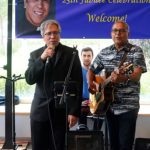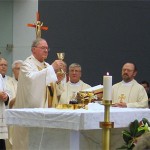Pentecost, a Jewish celebration, originated as an agricultural festival of thanksgiving for the early crop, the ingathering of the grain harvest, which had begun at Passover. Later Judaism transformed it into a feast of salvation history celebrating the giving of the Law at Sinai and the establishment of Israel as God’s people.
The apostles were probably celebrating this feast when all was changed as the Holy Spirit swept into their lives with the power of a mighty wind and the gentleness of tongues of fire resting over the apostles and Mary. This Spirit’s coming brought about great changes in the early Christian Jewish community. The old feast of the Law became the new feast of the life giving Spirit.
The violent wind of the Holy Spirit forced the frighten followers of Jesus who had hidden behind locked doors out into the crowded streets of Jerusalem to proclaim in many languages the wonderful work of God – the raising of Jesus from the dead.
As Paul tells us in his letter to the Corinthians the Holy Spirit enriched the church with a variety of gifts. But these gifts are given for the benefit of the whole community not the gifted individual.
We still believe the Holy Spirit guides the church today, the Holy Spirit is the source of the Church’s holiness despite the sinfulness of its members.
But how does the Holy Spirit touch our lives today? I like to think that it is not through a violent wind but through a nudge, a poke, a push. The Spirit nudges us to be more patient with others; the Spirit nudges us to keep our hurtful thoughts and words to ourselves. The spirit nudges us to visit a friend who is house bound or offer a ride to that person so they can get out of the house. The Spirit nudges us to bite our tongue and not say a caustic or hurtful answer in our conversation with someone. The Spirit pushes us to speak up for someone who has been put down by a racist or sexist remark. The Spirit pushes us to be involved in different parish activities such as being involved with the St. Vincent de Paul or the Good Shepherd Refuge. The Spirit nudges us to pray for our wounded church, wounds caused by a lack of honesty from our leadership.
We pray that the Holy Spirit broaden the horizons of our minds beyond our personal concerns and see the broader picture. We ask the Spirit to broaden the horizons of minds to appreciate the beauty and the woundedness of God’s good creation. We can ask the Spirit to help us appreciate the reality of climate change and the impact it will have on our children’s, children’s children. May the Spirit broaden the horizons of our minds to see the evils of racism and the fear of the stranger, broaden the horizons of our minds to see destructiveness of nationalism, the evils of world hunger and poverty. May our minds be broadening to the goodness in all peoples, in all faiths.
As we continue to celebrate this Spirit filled feast we pray for ourselves and for each other that we are responsive to the nudges, the poking of the Holy Spirit that we be open to the goodness and the needs of others and appreciate the goodness found within ourselves.
 Founded by St. Paul of the Cross, every Passionist takes a special vow to spend his or her energies in promoting remembrance of the sufferings of Jesus, the memory of the Cross, and reflection of the meaning of the Cross for the world.
Founded by St. Paul of the Cross, every Passionist takes a special vow to spend his or her energies in promoting remembrance of the sufferings of Jesus, the memory of the Cross, and reflection of the meaning of the Cross for the world.




